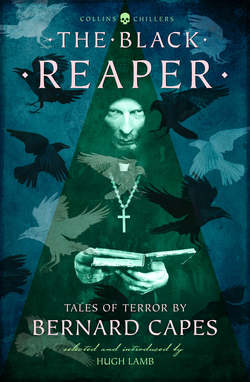Читать книгу The Black Reaper: Tales of Terror by Bernard Capes - Bernard Capes - Страница 13
WILLIAM TYRWHITT’S ‘COPY’
ОглавлениеThis is the story of William Tyrwhitt, who went to King’s Cobb for rest and change, and, with the latter, at least, was so far accommodated as for a time to get beyond himself and into regions foreign to his experiences or his desires. And for this condition of his I hold myself something responsible, inasmuch as it was my inquisitiveness was the means of inducing him to an exploration, of which the result, with its measure of weirdness, was for him alone. But, it seems, I was appointed an agent of the unexplainable without my knowledge, and it was simply my misfortune to find my first unwitting commission in the selling of a friend.
I was for a few days, about the end of a particular July, lodged in that little old seaboard town of Dorset that is called King’s Cobb. Thither there came to me one morning a letter from William Tyrwhitt, the polemical journalist (a queer fish, like the cuttle, with an ink-bag for the confusion of enemies), complaining that he was fagged and used up, and desiring me to say that nowhere could complete rest be obtained as in King’s Cobb.
I wrote and assured him on this point. The town, I said, lay wrapped in the hills as in blankets, its head only, winking a sleepy eye, projecting from the top of the broad, steep gully in which it was stretched at ease. Thither few came to the droning coast; and such as did, looked up at the High Street baking in the sun, and, thinking of Jacob’s ladder, composed them to slumber upon the sand and left the climbing to the angels. Here, I said, the air and the sea were so still that one could hear the oysters snoring in their beds; and the little frizzle of surf on the beach was like to the sound to dreaming ears of bacon frying in the kitchens of the blest.
William Tyrwhitt came, and I met him at the station, six or seven miles away. He was all strained and springless, like a broken child’s toy – ‘not like that William who, with lance in rest, shot through the lists in Fleet Street’. A disputative galley-puller could have triumphed over him morally; a child physically.
The drive in the inn brake, by undulating roads and scented valleys, shamed his cheek to a little flush of self-assertion.
‘I will sleep under the vines,’ he said, ‘and the grapes shall drop into my mouth.’
‘Beware,’ I answered, ‘lest in King’s Cobb your repose should be everlasting. The air of that hamlet has matured like old port in the bin of its hills, till to drink of it is to swoon.’
We alighted at the crown of the High Street, purposing to descend on foot the remaining distance to the shore.
‘Behold,’ I exclaimed, ‘how the gulls float in the shimmer, like ashes tossed aloft by the white draught of a fire! Behold these ancient buildings nodding to the everlasting lullaby of the bay waters! The cliffs are black with the heat apoplexy; the lobster is drawn scarlet to the surface. You shall be like an addled egg put into an incubator.’
‘So,’ he said, ‘I shall rest and not hatch. The very thought is like sweet oil on a burn.’
He stayed with me a week, and his body waxed wondrous round and rosy, while his eye acquired a foolish and vacant expression. So it was with me. We rolled together, by shore and by road of this sluggard place, like spent billiard balls; and if by chance we cannoned, we swerved sleepily apart, until, perhaps, one would fall into a pocket of the sand, and the other bring up against a cushion of sea-wall.
Yet, for all its enervating atmosphere, King’s Cobb has its fine traditions of a sturdy independence, and a slashing history withal; and its aspect is as picturesque as that of an opera bouffe fishing-harbour. Then, too, its High Street, as well as its meandering rivulets of low streets, is rich in buildings, venerable and antique.
We took an irresponsible, smiling pleasure in noting these advantages – particularly after lunch; and sometimes, where an old house was empty, we would go over it, and stare at beams and chimney-pieces and hear the haunted tale of its fortunes, with a faint half-memory in our breasts of that one-time bugbear we had known as ‘copy’. But though more than once a flaccid instinct would move us to have out our pencils, we would only end by bunging our foolish mouths with them, as if they were cigarettes, and then vaguely wondering at them for that, being pencils, they would not draw.
By then we were so sinewless and demoralised that we could hear in the distant strains of the European Concert nothing but an orchestra of sweet sounds, and would have given ourselves away in any situation with a pound of tea. Therefore, perhaps, it was well for us that, a peremptory summons to town reaching me after seven days of comradeship with William, I must make shift to collect my faculties with my effects, and return to the more bracing climate of Fleet Street.
